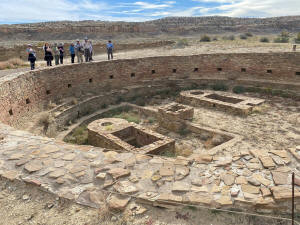US bans new oil and gas leasing around New Mexico cultural site
 Send a link to a friend
Send a link to a friend
[June 02, 2023]
(Reuters) - The Biden administration said on Friday it would stop
issuing new oil and gas drilling leases within 10 miles of the Chaco
Culture National Historic Park, a region central to Pueblo ancestral
heritage in northwest New Mexico.
Tribes, conservationists and state officials have long called on the
federal government to ban drilling in the area. Structures in the area
date back thousands of years, and the park is listed as a World Heritage
Site by UNESCO, the United Nations' cultural agency.
|

Tourists view Pueblo Bonito, one of a series
of Puebloan structures in Chaco Culture National Historical Park
believed to have been used as ceremonial as well as administrative and
trading centers and built over multiple decades between the 9th and 12
centuries, in Chaco Canyon, New Mexico, U.S. October 21, 2021. Picture
taken October 21, 2021. REUTERS/Dan Grebler |
|
President Joe Biden first proposed protecting the area in
November of 2021. It is aligned with his goal to conserve at
least 30% of federal lands and waters by 2030.
But, the Interior Department ban on new leasing on federal lands
around Chaco will last for just 20 years and does not extend to
private, state or tribal lands.
"Today marks an important step in fulfilling President Biden's
commitments to Indian Country, by protecting Chaco Canyon, a
sacred place that holds deep meaning for the Indigenous peoples
whose ancestors have called this place home since time
immemorial,” Interior Department Secretary Deb Haaland said in a
statement.
Haaland, a New Mexican who is the nation's first Native American
cabinet secretary, is a member of the Pueblo of Laguna tribe.
New Mexico's Congressional delegation introduced a bill this
year that would go a step further than the Interior order by
permanently protecting the region.
Oil and gas industry groups have opposed withdrawing the lands
around Chaco for leasing.
In addition, the Navajo Nation withdrew its support for the plan
last month, saying its members could lose potential income tied
to those resources.
The U.S. Bureau of Land Management last year estimated that
protecting the lands would result in the long-term loss to the
federal government of $4.8 million a year in royalties. It also
said about 49 jobs would not be created.
(Reporting by Nichola Groom; Editing by Kim Coghill)
[© 2023 Thomson Reuters. All rights
reserved.] Copyright 2022 Reuters. All rights reserved. This material may not be published,
broadcast, rewritten or redistributed.
Thompson Reuters is solely responsible for this content.

|
|
|



